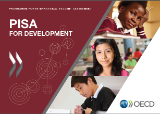PISA for Development - Background
|
Since 2000, every three years, some 80 countries and economies – including 40 middle-income countries and 4 low-income countries – collaborate to compare how well their school systems prepare young people for life and work. The framework for these comparisons is an international assessment of the knowledge and skills of 15-year-old students known as Programme for International Student Assessment (PISA). As more countries joined PISA, it became apparent that the design and implementation models for the assessment needed to evolve to successfully cater to a larger and more diverse set of countries, including a growing number of middle- and low-income countries. In response to this challenge, the OECD and a number of partners launched the PISA for Development initiative in 2013, which further develops and differentiates the PISA data-collection instruments to produce results that better support evidence-based policy making in middle- and low-income countries. PISA for Development aims to:
PISA for Development aims to increase middle- and low-income countries' use of PISA assessments for monitoring progress towards nationally-set targets for improvement, for the analysis of factors associated with student learning outcomes, particularly for poor and marginalised populations, for institutional capacity-building and for monitoring international educational targets in the Education 2030 framework being developed within the UN’s thematic consultations. It will do this using enhanced PISA survey instruments that are more relevant for the contexts found in middle- and low-income countries but which produce scores that are on the same scales as the main PISA assessment. The pilot project will also develop an approach and methodology for including out of school children in the surveys. The project's results will be obtained over a 4-year period (2015-18) through a partnership involving eight low-income countries, concerned development partners (DAC members plus the World Bank, UNESCO, UNICEF and other UN bodies and regional organisations), contractors Educational Testing Service and The Learning Bar, and the OECD.
Back to PISA for Development Home |
Contact the team |
Related Documents



